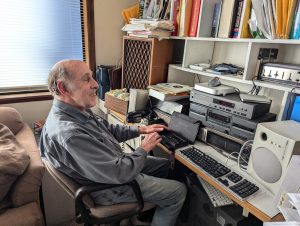Deciding to stay or leave campus housing for winter quarter
Number leaving and entering campus housing exceeds expectations
November 18, 2020

As autumn quarter comes to a close, some on-campus students at Seattle Pacific University have decided not to return to their dorms for Winter Quarter.
“I loved the campus and making friends with the people on the floor, but I plan on going home to work and save some money,” said first-year Noelia Hernandez.
Since Hernandez’s classes will all be online next quarter, she felt that paying the housing fee was not worth it, especially considering the financial hardships that have come with the pandemic.
“I really do think that SPU was doing good about COVID-19 though,” said Hernandez. “We didn’t have nearly as many cases as I expected to.”
She said that if she had any in-person classes next quarter she would have definitely stayed, but plans to move back to campus for spring quarter regardless.
“The only reason I’m leaving is financial reasons, other than that, I’d definitely stay,” said Hernandez.
First-year Anna Dominguez weighed the pros and cons of leaving on-campus housing for winter quarter, but she decided to stay for her in-person classes.
“My main reason for going home was the price,” said Dominguez. “It’s hard to justify the cost of room and board when I only have on-campus meetings twice a week. I decided to stay because one of those meetings is at 8 a.m. and I think I focus better at school.”
First-year Lucia Flores-Wiseman also considered leaving campus for winter quarter to take classes online, but ultimately decided to leave SPU altogether.
“I decided to leave because SPU was a lot more expensive than my family anticipated,” said Flores-Wiseman. “We thought it was going to be cheaper, so I decided that because it feels like the same education I would get at a community college it feels overpriced to me.”
She said she’d prefer to just get her Associates Degree at a community college and then transfer to a public university to save her family more money and get the value they were hoping for.
“At first, I was thinking about just leaving to live at home and continuing to go to SPU online. During a pandemic, it just doesn’t feel beneficial when you can’t be with other people,” said Flores-Wiseman.
She said it’s hard to build a sense of community when you’re trying to be safe, and you can’t get close to people.
“I feel like with such high costs and so little benefits it’s not really worth it, in my opinion, especially because I’ve been trying to be really safe about who I’m hanging out with,” said Flores-Wiseman.
She said that despite having in-person classes, by trying to stay safe with the pandemic and staying particular about who she spent time around, she wasn’t able to connect with the community at all.
“I had like two classes that I would go to in-person a couple of times a week. That was pretty good, but honestly, it felt like we were just on a Zoom call but in person,” said Flores-Wiseman. “Being six feet apart, it just doesn’t feel like you can really engage in anything. So, to me, it doesn’t even feel like it’s worth going to in-person classes.”
She said that she definitely would have stayed at SPU if the cost was lower, but it’s hard not knowing how long we’ll be in a pandemic.
“I know that some people didn’t do the same as me, but they are feeling really connected,” said Flores-Wiseman. “That’s a good benefit for them, but since I didn’t see any benefits from it, I don’t want to be wasting my money.”
Senior Vice President for Finance and Administration, Craig Kispert, said that while the number of students notifying the university of their plans to leave campus housing at the end of fall quarter is higher than they had anticipated, so is the number of new applicants for campus housing for winter quarter.
With seven weeks left before the start of winter quarter, University Services is monitoring the new applications and cancellations daily against winter quarter projected housing levels and any resulting financial impacts.
“The net difference between these two adjustments is about what was anticipated for an adjustment between quarters,” said Kispert. “If that difference holds through the upcoming break, there is not anticipated to be any additional housing impact on school-wide finances than was presented by the housing numbers to start the year.”

























































































